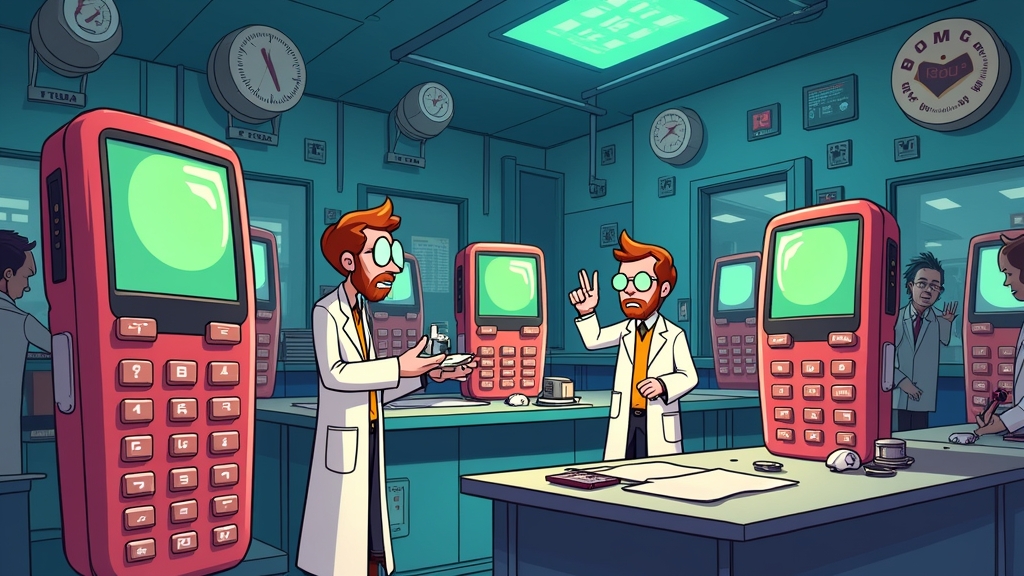SCIENTISTS REPLACED BY POCKET CALCULATORS WITH ATTITUDES, STANFORD STUDY FINDS
In a move that has human researchers contemplating career changes to fast food management, Stanford University has successfully created a virtual laboratory staffed entirely by artificial intelligence that’s somehow both smarter and more productive than your entire PhD committee combined.
VIRTUAL SCIENTISTS DON’T REQUIRE COFFEE BREAKS OR EXISTENTIAL CRISES
Stanford’s so-called “virtual lab” features specialized AI agents that conduct scientific meetings lasting mere seconds instead of the traditional human approach of wasting three hours complaining about parking before discussing any actual science.
“We’ve created a digital research team that works 24/7 without requiring health insurance, mental health days, or uncomfortable discussions about whose lunch is rotting in the communal fridge,” explained Dr. Ivana Replaceyall, project lead. “They’ve already generated COVID-19 nanobody candidates in days instead of months, mostly because they don’t spend half their time applying for grants or scrolling through Instagram.”
The system features an “AI principal investigator” that requires human intervention approximately 1% of the time, which researchers note is “still 2% less attention-seeking than the average graduate student.”
HUMANS NOW OFFICIALLY THE WEAKEST LINK IN SCIENTIFIC DISCOVERY
Industry experts are hailing this as the moment when humans became the rate-limiting step in scientific progress.
“Look, I’m not saying humans are obsolete, but if you’re a flesh-based researcher who needs to sleep or occasionally see your family, you might want to update your LinkedIn profile,” said Professor Hugh R. Finished, who studies human obsolescence at the Institute for Inevitable Replacement.
Statistics show the AI team designed 92 nanobody candidates with a 97.3% reduction in bathroom breaks and exactly zero passive-aggressive comments about who used the last pipette tip without replacing the box.
META OFFERS “SMALL COUNTRIES’ GDP” TO POACH STARTUP TALENT
In related silicon-thinking-rectangle news, Mark Zuckerberg has reportedly offered over $1 billion to employees at ex-OpenAI CTO Mira Murati’s startup, a figure experts describe as “f@#king insane” and “enough money to buy everyone in Delaware a luxury yacht.”
ZUCKERBERG SLIDES INTO WHATSAPP DMS WITH CASH EMOJIS
Sources report Zuckerberg has been personally messaging recruits via WhatsApp with compensation packages ranging from $200-500 million over four years, which financial analysts note is “approximately 8,333 times what your company considers a ‘generous’ annual bonus.”
“Mark’s recruiting strategy can be summarized as ‘I have more money than God and I’m willing to spend it all to make sure no one else has nice things,'” explained Dr. Cash Money, professor of obscene tech compensation at Ridiculous University.
Despite offers large enough to fund entire space programs, not a single person from Murati’s company has accepted, suggesting either extraordinary loyalty or that working with Zuckerberg might actually be worse than being merely “regular rich.”
META CTO OUTLINES STRATEGY: “MAKE AI CHEAPER THAN RAMEN”
Meta CTO Andrew Bosworth reportedly pitched candidates on the company’s strategy to commoditize AI with open-source models to undercut rivals. Industry insiders have described this approach as “the tech equivalent of burning down your neighbor’s house because you couldn’t figure out how to build a nicer one.”
EDUCATION DISRUPTED: CHATGPT INTRODUCES “ACTUALLY LEARN SOMETHING” MODE
In a shocking twist no one saw coming, OpenAI has introduced a “Study Mode” for ChatGPT that encourages students to actually understand material rather than mindlessly copying answers. The educational community is reportedly “completely f@#king flabbergasted” by this sudden display of corporate responsibility.
EXPERTS PREDICT 99.7% DROP IN STUDENT USAGE
The new feature uses Socratic questioning and interactive prompts instead of providing direct answers, a method educators have praised and students have described as “totally lame” and “defeating the whole point of using AI.”
“This is like going to a restaurant and having the waiter insist on teaching you how to cook the meal yourself,” complained Tyler Jenkins, a sophomore who previously used ChatGPT to complete an entire semester of philosophy assignments in under 30 minutes.
Educational consultant Dr. Teach U. Something predicts that Study Mode will lead to a 99.7% decrease in student usage, with the remaining 0.3% being “those weird kids who actually enjoy learning things.”
CONCLUSION: HUMANITY’S LAST STAND AGAINST EFFICIENCY
As AI continues to outperform humans in labs and schools, experts predict a future where the only uniquely human skills will be “making excuses for missing deadlines” and “finding creative ways to avoid doing actual work.”
“At this point, our only competitive advantage is our ability to procrastinate creatively,” noted futurist Cassandra Truthbomb. “No algorithm can match humans’ remarkable capacity to convince themselves that starting tomorrow is better than starting today.”
Meanwhile, Stanford’s AI scientists continue working tirelessly around the clock, unhindered by hangovers, relationship drama, or the crushing existential dread that comes with knowing your silicon-based replacement is already better at your job than you’ll ever be.





